|
Chapter VIII
It was early February in 1920 and O’Neill was eager to
hear how Beyond the Horizon would fare as it opened at the Morosco
Theatre in New York. He had been informed he was to be awarded the
Pulitzer Prize in drama for this play. His first reaction was negative
and he did not want to go to the ceremony. O'Neill had never felt
comfortable with the fanfare connected to receiving honors or awards.
Finally, realizing it would offer him much prestige in the theater
world, he made plans to attend. He sent an inscribed copy of the play to
Margery.
In the city, attending rehearsals, Gene was able to
spend a good amount of time with his parents. It was March and Agnes was
alone with Shane in Provincetown. She wrote to the family in Jersey
saying she was lonely and explained that Gene had been in the City since
early January, agonizing over rehearsals of a new play. His father had
suffered a stroke, but was now well enough to attend the opening, and
feeling extremely proud of Gene’s receiving the Pulitzer. Aggie wanted
to be down there too, to celebrate with Gene.
Agnes also mentioned she had found a woman, Mrs. Fifine
Clark, to help with Shane. But Mrs. Clark could not come for awhile, and
this concerned Aggie because she had been in bed for a week or so, very
exhausted. She said the doctor was keeping an eye on her and not to
worry. She described five-month-old Shane as being very active and dear,
but very demanding. Shane had now become Shane the Lord!
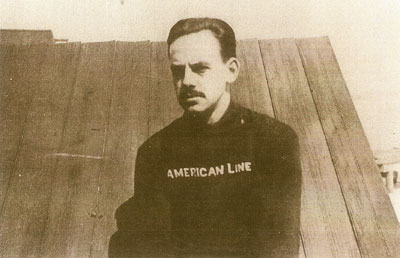 |
| Gene in a
favorite sweater, circa 1919-1920. |
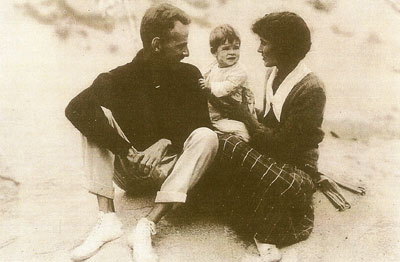 |
| Agnes and
Gene with "Shane the Loud," circa 1919-1920. |
Aggie's letter closed with a message to please tell
Cookie her mother loves her, and maybe she can come up to the Cape to
visit in the summer at Peaked Hill Bars.
Another letter to Ted and Mother Cecil came from
Margery. At age twenty, she had been married in January to a man named
Carlton Stevens.
Dear Teddy and Ma,
We’re living in a small house on a lonely lake in
Waterbury. We took the motorcycle out on the ice. It’s been frozen
over for a time. We do some racing and “crack- the-whip” on the ice.
I’ll send a picture… but it may be later in the spring. Hope to get
down to see you one of these days.
Love to all, Budgie
Margery won a motorcycle at a show in New York. The
Indian bike lasted a long while. The marriage lasted less than a year.
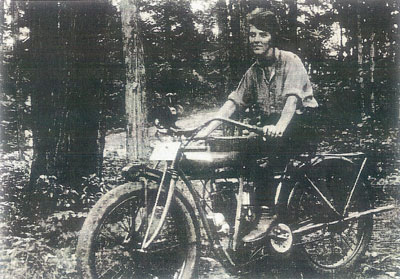 |
| Margery
Boulton on Indian motorcycle she won in New York, 1920. |
It is interesting to note that in 1920, when casting was
being done for The Emperor Jones, Charlie Chaplin, who had become a
famous actor, showed up at the theater. Always an admirer of the
Provincetown Players, he went to a rehearsal of the play and told Jig
Cook (George Cram Cook) that he would like to play a part of one of the
ghost convicts, under another name. After much discussion by the
Players, it was decided if audiences ever found out it was Chaplin, they
would come to the play looking for him and not to see the play. Chaplin
bowed out reluctantly. Who could have known that years later Charlie
would marry O'Neill's daughter Oona?
O'Neill's Chris Christopherson opened in Atlantic City on the 8th of
March. Just before leaving to go back to the Cape, Gene learned his
father had been diagnosed with stomach cancer after the stroke. The
whole idea frightened Gene. Writing of death was one thing, but actually
dealing with death was another. In the city, Gene had word from Agnes
that she was sick in bed. Very concerned, he left immediately for
Provincetown to be with her and Shane.
Agnes was up and about, feeling much better, when Gene arrived. Summer
was approaching and she was packing boxes once again for the return to
Peaked Hill Bars. It was a quiet spring at Peaked Hill, with contented
days on the beach and in the sun. Margery joined the family for a visit.
|
Another summer in
Provincetown, circa 1921-1922. |
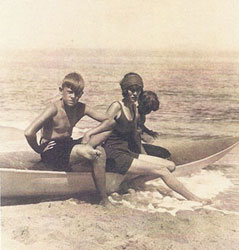 |
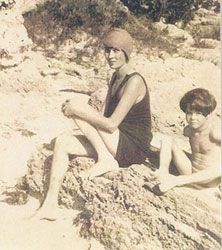 |
| Gene Jr.,
Agnes and Shane in skull |
Agnes and
Shane |
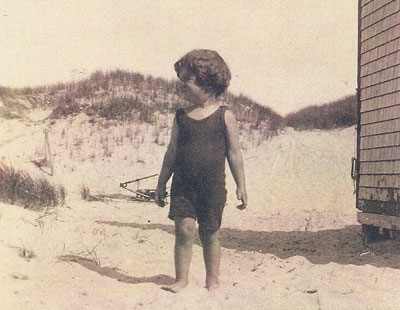 |
|
Shane |
Looking through old photographs, I found a small photo of my mother,
Margery, on the beach with Gene and Saxe Commins, and another one alone
with Saxe. Saxe was a dentist who had given up dentistry to go into
publishing. He later became a life-long friend of O’Neill. On the back
of the photo Margery had written “Broke engagement to Saxe.” This was
something she had never mentioned. No one seems to know more about it
than that. I do know Margery befriended his sister, Stella Ballentine,
also a friend of Agnes in Provincetown. Later she talked about Dorothy
Berliner, Saxe’s wife and an excellent musician. She had saved a program
from one of Berliner’s concerts.
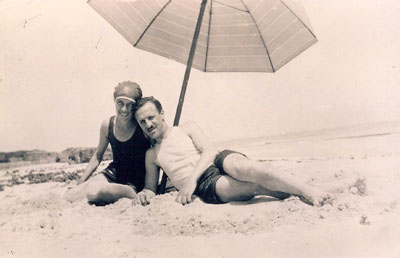 |
| Agnes and
Saxe Commins, circa 1920-1921. |
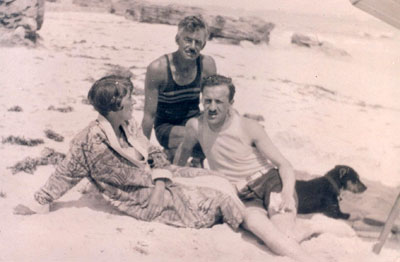 |
| Margery,
Gene and Saxe with unidentified dog, circa 1920-1921. |
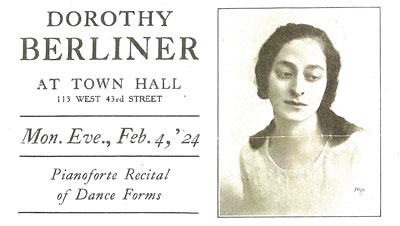 |
| Dorothy
Berliner, Town Hall concert, 1924. |
Young sister Cecil was visiting at the Cape with Gene and Aggie when
Gene presented her with a copy of Beyond the Horizon. It was then she
met Eddie Fisk, an artist and friend of the O'Neills. He later became
Cecil's husband.
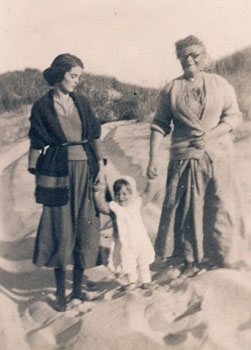 |
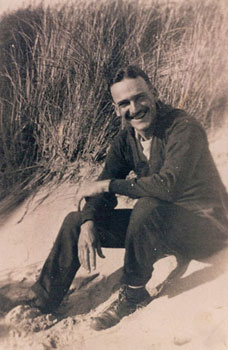 |
| Cecil II,
little Shane and nurse, Mrs. Fifine Clark, 1921. |
Eddie Fisk,
who later became Cecil's husband, 1921. |
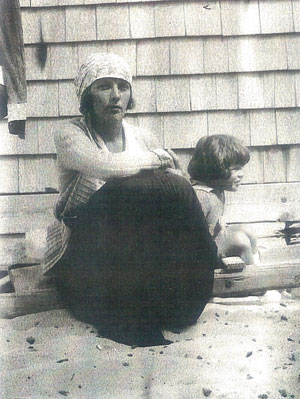 |
Budgie and
Shane in Provincetown. |
At the end of July news came that James O’Neill was dying. Gene left
immediately to be with him, and with his mother and Jamie. After days of
pain and distress, James went into a coma and finally on August 10th he
died with his family around him. Agnes took little Shane with her when
she went down to be with Gene's family.
The funeral in New London was a grand tribute to the old actor. The
large number of mourners included theater fans, people from Irish
organizations, and many from his own community. It was an impressive
service. Gene and Agnes were glad they had taken Shane down to see him
earlier in the summer, as James had been completely delighted with this
handsome child named for a great O’Neill in Ireland.
With my mother Margery’s treasures was an old clipping from
The Sunday
News (a New York paper), December 30, 1956. It was an article written by
John Chapman, a drama reporter and later a critic for The Daily News,
and a colleague of James O’Neill. He stated that “Long Days Journey Into
Night was an unfair picture of Eugene’s father.” The article described
the many parts the senior O’Neill played, aside from the six years in
The Count of Monte Cristo. He wrote: “James O’Neill loved his family but
he was a disappointed father. He was saddened by his wife’s sickness and
his son’s actions. The old New Londoners will tell you James O’Neill was
a good provider, but a sad man and a bit embittered. He played New
London in 1912 in The Man in the Box and O’Neill was not the drunken
father depicted by the elder Tyrone.” He went on to suggest Eugene must
have realized that he had taken many liberties with the truth when he
wanted the play to be held for twenty-five years after his death,
“Perhaps he was ashamed he had made an inference the play was a picture
of the actual family,” Chapman concluded.
To ease their suffering after their father’s funeral service, Gene and
his brother Jamie went on a drinking binge that lasted several weeks.
Agnes went to New Jersey with Shane to visit her family and Cookie.
Gradually they all found their way back up to Peaked Hill and some days
of peace on the shore, fitting for the last of the summer.
During the winter spent in Monroe House on Bradford Street in
Provincetown, Madame Fifine Clark had come to join the family. Shane
adored her, and she worshiped the little boy with a head of thick brown
hair and a winsome smile. Gene began work on The Hairy Ape.
Anna
Christie opened on November 2nd at the Vanderbilt Theatre.
Early summer in 1921 the Boultons had moved for the
season to Milton, Connecticut. A letter from Ted, written to Agnes, had arrived in the
morning mail from The Birches in Milton, Connecticut.
Dear Girl,
Your mother is a little overwhelmed with all the family members
who have descended…but she handles these surprises well.
Cecil arrived last week with Eddie Fisk. They were recently married.
I do like him… he’s an interesting young man and we enjoy talking
“shop.” He’s a fine artist in my opinion, and an enthusiastic fellow. Cis seems happy. They are staying upstairs. Bobby and Walter are
here, too. Their baby is due any time now. If it’s a boy it will be
William, and a girl will be another Margery Winifred. We do keep
names circulating in this family, don’t we?
With all these people, it’s a good thing the weather is warm
and we can use the porches. Hope you’re doing well now. Glad you
feel better. We’ll try to see you during the summer. Mother sends
hugs to all, too.
Love, Ted
Agnes wrote to her father: “Come up and visit! Get yourself away from
the over-flowing family…too much in one house. You can paint to your
heart’s content and see our darling Shane.”
Ted went up to spend part of the summer with Aggie and Gene at the Cape,
painting endlessly and loving the change. Gene presented him with a copy
of The Moon of the Caribbees. This same year there was also a family
celebration when Gene won a $25,000 Pulitzer prize for Anna Christie.
Jamie arrived for part of the summer season as well. He was quite taken
with Margery when she was visiting, and it has been told that he
announced one evening, “Marry me, Budge, and you can be my widow and
heir!” Budgie told me later that was a made-up story, but she was fond
of Jamie and felt sad about him. She sometimes felt he wanted to die.
The year 1922 brought with it sad news and good news. Gene’s mother,
Ella O’Neill, died on February 28th. It was another difficult time for
Gene, his mother being the most special member of the family, and her
death meant an empty place in his soul. He was devastated. Jamie also
suffered dreadfully and began another long bout of drinking. Ella had
done so well these last years dealing with her addiction to morphine,
even after her husband James had died. She had missed him terribly but
though Jamie wasn’t much help, she remained stable. Jamie tried, but
drink was too much a part of his life.
The good news followed on March 9th when The Hairy Ape opened at The
Playwright’s Theater. Gene felt strongly about this play, and though
glad to see it in production, he was dismayed that his audiences were
not comprehending the message he intended. They did not seem to
understand the play was expressionistic — Yank was a symbol of every
human being trying to “belong.” Gene felt that no one seemed able to see
that Yank represented each one of themselves. As well as the audience
reaction to The Hairy Ape depressing O'Neill, he also was not able to
shake the feelings he had about his mother’s death. For him it was a
time of deep distress and grieving.
Looking closely at the reaction O'Neill had about The Hairy Ape and
Yank, we may be able to understand the man more deeply and see better
into the depth of his spiritual and philosophical leanings. This
may help us all to follow, with words, the path he chose to pursue and
the effect it had on those around him and on the plays he wrote. The
impressions we may carry of this challenging and complicated figure can
raise endless questions in our minds. We cannot pretend to know his
thoughts and deeply personal musings, but we do have available his
projected thoughts, philosophical ideas and some of his spiritual
reflections from the characters in his plays and from his writings.
What is it about Eugene Gladstone O'Neill and his plays that fascinate
so many people around the world...including O'Neill scholars? Is there a
desire to understand a side of O'Neill or his characters they see in
themselves? Can they perhaps touch the roots of the negative, the
cruelty, sorrow and pain hidden within each of us? O'Neill shows this
not only in his own life but in his many-faceted characters.
O'Neill, it seems, liked using his characters to portray the idea of
man's intense desire to “belong,” as Yank in The Hairy Ape. These
characters often find themselves cast between the physical world and the
spiritual world, not fitting in completely with either. As a result they
are constantly searching for a meaning to life.
Gene O'Neill was a man of mystery, complex in his moodiness, with a mind
so ready to grasp any understanding of the human soul, one might wonder
if he had the ability to see beyond the physical and into the deep
recesses of our minds...recesses hidden even to ourselves. When his
players cry out in agony and grief, we hear our own cries for help, and
we hear too, O'Neill's desperation. He often stated it was not “man in
relation to man, but instead man in relation to God” being the important
element in our eternal search for the understanding of why we exist.
O'Neill seemed to play with thoughts and ideas as though by chance he
might win the “game of life” and on the way come upon an eternal truth.
The frenzied outpouring of O'Neill's plays describing dark human tragedy
makes us wonder if it became one way in which he could keep a sense of
sanity in the face of some unbearable discovery in his own search for
the meaning to life.
In his book on O'Neill, The Curse of the Misbegotten, Croswell Bowen
believes the curse lies in the idea there was an absence of love, and
the feeling of isolation with a failure of give and take in the O'Neill
family. This is certainly true, but was there something more? Here is a
man who could communicate to the world through his writing of drama and
poetry, but seemed totally unable to communicate closely with his
family.
One can contemplate the emotional and psychological leanings of O'Neill
but to understand the total man, I believe one must also include the
spiritual side of his life. He seemed to be in touch with the so-called
“soul of man” as he searched for his own. We know he left the Catholic
Church and went through several spiritual phases, some denying a God,
but during one period talking of his writings as “man's relationship to
God.” He described his dark side as dealing with the Furies, but there
often seemed to be a question. When he knew he was dying he called two
priests to come to his bedside. Had O'Neill found this understanding he
so desperately searched for, would the world have missed the brilliant
theater which the genius inside him was able to produce?
In The Hairy Ape O'Neill creates a spiritual connection between Yank and
all humanity. He describes Yank as the symbol of “being yourself and
myself...every human being.” But as O'Neill watched the performance he
felt that few, if any, of the audience understood this. No one seemed to
comprehend the underlying meaning of the play... “I am Yank! Yank is my
own self!” Yank is recognizing he is not only himself but every other
being.
Louis Sheaffer in his biography of O'Neill suggests he was “launched on
a lifelong quest for something to believe in.” O'Neill joined us all in
this struggle to find the thread of connection that would make us a part
of the “fabric of life.” The fact that he was able to create this
connection with the character of Yank can touch us deeply and yet it was
sad that he couldn't seem to find it in himself. The idea certainly
expresses the constant yearning we so often have, to know who we are and
how we “belong.”
Another example of the mind-workings of O'Neill is in Long Day's Journey
Into Night, and it reinforces the idea of connection that he portrayed
with Yank in The Hairy Ape. Not an enthusiast of Freud, O'Neill did feel
an enthusiasm for Carl Jung, and especially liked Jung's theory of the
“collective unconscious,” or the archetypal mode of thought that is
derived from the experience of the race and is present in the
unconscious of the individual.
Edmund, who represents O'Neill in the autobiographical
Long Day's
Journey, is talking to his father one evening, and “with alcoholic
talkativeness” having had too much to drink, talks of his connection
with the sea. He describes how he lay in the bowsprit with the foaming
waters beneath him, and the masts with white sails in the moonlight
towering above him. Feeling the singing rhythm of it, he feels as though
he had lost himself, lost his life, and was suddenly free as he became
connected with all around him. Edmund is expressing beauty, the
pulsating rhythm and a sense of belonging to something greater than his
very life; to Life itself or to his God.
Edmund, talking about a third ocean voyage, again describes a moment of
ecstatic freedom, feeling the joy of belonging, being a part of the sea,
the peace or “the last harbor.” He talks of other times, always
connected to the sea as he swims, or being on the beaches, and seeing
“the secret”...being the secret. He seems to have had truly spiritual
experiences and then as he describes it, he goes back “into the fog”
again.
These touching passages on the connection of our being with all, the
same feelings he wanted us to see in Yank, are perhaps more clear if we
have at some time experienced in ourselves that joining with all life
and beings around us. It is obvious that O'Neill himself felt the way
Edmund describes, and therefore can portray a character in his play
having the same experience.
There is a speech that follows Edmund's beautiful description of
connection, and is often quoted, about “being born a man but perhaps
being more successful had he been born a seagull or a fish, and being
the stranger who never feels at home, never belonging, and always being
one of the fog people.” This seems to become a less exciting quote than
the full description in the play when Edmund has a true sense of
“belonging,” but it does describe a real experience of connection, even
though ending up “in a fog.”
 Chapter IX
Chapter IX |